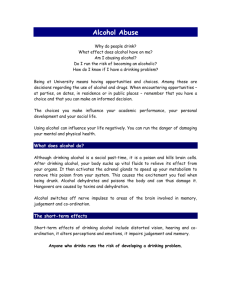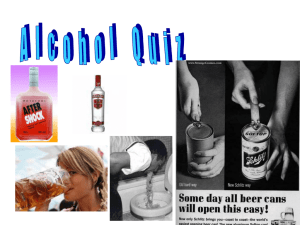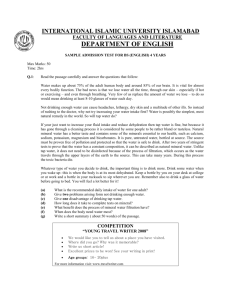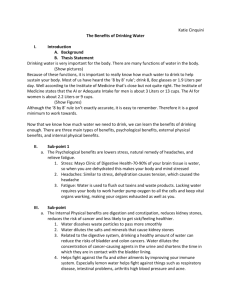Alcohol and American College Life Disclaimers: This issue and all
advertisement
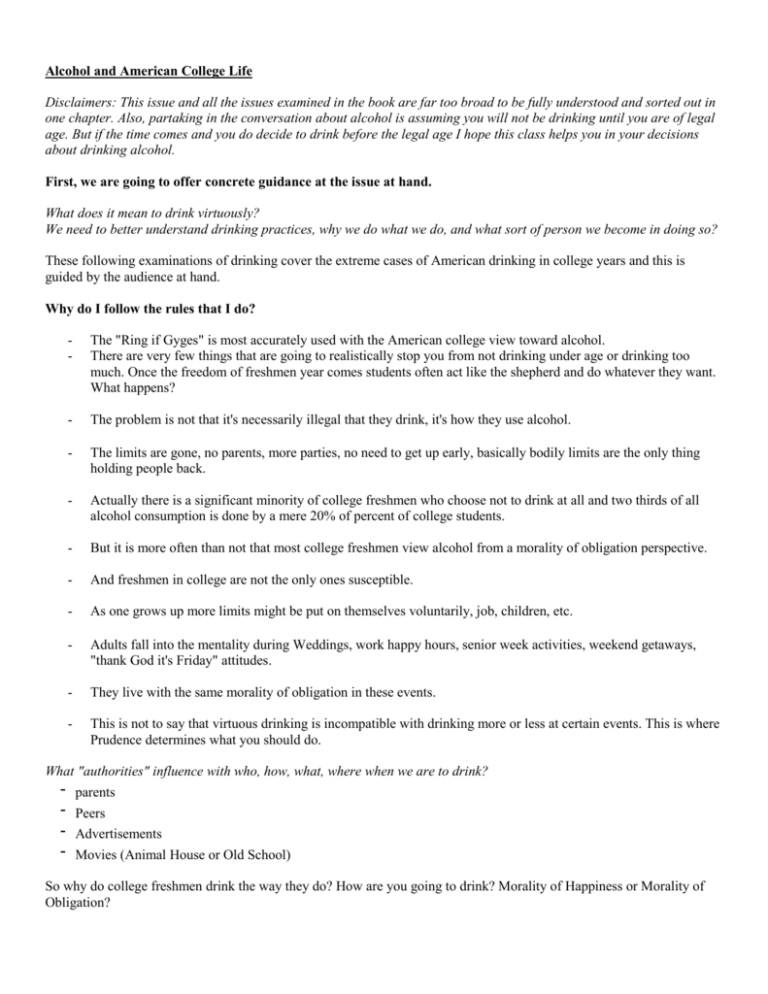
Alcohol and American College Life Disclaimers: This issue and all the issues examined in the book are far too broad to be fully understood and sorted out in one chapter. Also, partaking in the conversation about alcohol is assuming you will not be drinking until you are of legal age. But if the time comes and you do decide to drink before the legal age I hope this class helps you in your decisions about drinking alcohol. First, we are going to offer concrete guidance at the issue at hand. What does it mean to drink virtuously? We need to better understand drinking practices, why we do what we do, and what sort of person we become in doing so? These following examinations of drinking cover the extreme cases of American drinking in college years and this is guided by the audience at hand. Why do I follow the rules that I do? - The "Ring if Gyges" is most accurately used with the American college view toward alcohol. There are very few things that are going to realistically stop you from not drinking under age or drinking too much. Once the freedom of freshmen year comes students often act like the shepherd and do whatever they want. What happens? - The problem is not that it's necessarily illegal that they drink, it's how they use alcohol. - The limits are gone, no parents, more parties, no need to get up early, basically bodily limits are the only thing holding people back. - Actually there is a significant minority of college freshmen who choose not to drink at all and two thirds of all alcohol consumption is done by a mere 20% of percent of college students. - But it is more often than not that most college freshmen view alcohol from a morality of obligation perspective. - And freshmen in college are not the only ones susceptible. - As one grows up more limits might be put on themselves voluntarily, job, children, etc. - Adults fall into the mentality during Weddings, work happy hours, senior week activities, weekend getaways, "thank God it's Friday" attitudes. - They live with the same morality of obligation in these events. - This is not to say that virtuous drinking is incompatible with drinking more or less at certain events. This is where Prudence determines what you should do. What "authorities" influence with who, how, what, where when we are to drink? - parents Peers Advertisements Movies (Animal House or Old School) So why do college freshmen drink the way they do? How are you going to drink? Morality of Happiness or Morality of Obligation? Why do I drink? (Intentions) Humans have the incredible power to do everything for a reason. So why do people drink alcohol. - For the taste For health reasons It changes the way you feel (the most common reason) Celebrations Social lubricant It fosters cheer Enjoy company and share stories Relax and unwind Is intentionally altering ones state of mind inherently bad? - Determining the answer requires answering the question "why do I drink?" And "do the reasons I drink help or impede my goals in drinking?" Good goals to drink vs. bad Bad - escaping reality - Drinking to impress - To loose inhibitions, to do things you wouldn't normally do. The good vs. bad reasons to drink seem very close. Relaxing vs. escaping reality. - Sometimes are intentions to drink (relaxing) might actually lead to a different object (feeling exhausted or sick the nest day) When the drinking inhibits our true happiness is when it is not a virtuous action or intention. - If alcohol becomes a need in order to have fun or relax it is assumed it is too important in our life. - If alcohol is actually an enjoyable activity that is at service to larger goals like family, friendship and leisure then are larger goals dictate whether we should drink or not. The alcohol does not control us, we control it to bring happiness to our life. Read Sirach 31:27-30 When drinking becomes the point, are very freedom is endangered. Freedom of excellence vs. freedom of indifference Alcohol should be so that we live our life excellently - does alcohol make us less free (addiction or control) or more free (enjoy the good things of life) Second, we are going to attempt to exemplify the virtue-centered morality-of-happiness approach of this book to the concrete issue at hand. Drinking and the formation of habits and desires. - One common assumption that people make when examining drinking alcohol as a moral issue is that drinking itself in not morally right or wrong. Rather, it is simply what happens when people drink (too much) that makes alcohol a moral issue. No one can contest that that drinking alcohol causes great harm to individual persons, and society as a whole. - Worldwide over 2 million people die each year to alcohol related incidents Especially on the effects on driving Sexual assault Domestic violence Health problems Leading cause of students dropping out of college An unintended consequences of all these statistics is that if we can illuminate these negative consequences of alcohol then we have eliminated the problems with alcohol. - Examples of these elimination programs like MADD and SADD have done a great job raising awareness. - These programs of awareness are geared toward the "transitive effects", the things outside ourselves that are effected by drinking too much. But what about the "intransitive effect"? - Our friendships can be deeply intertwined by our drinking habits. - Another example is our ability to have a healthy sexual relationship. - College life is often viewed in a bubble. It's not "real life" but what habits develop and shape our character while we are living in the "bubble". These character habits developed in college have lasting effects. - If the genuinely happy life is one were partying and alcohol is high on the priority list then we should be upfront about this and live out both college and post college life accordingly. But if it is not, why live as if it is during the college years? - Ultimately life responsibilities are "obligations" that hinder us from doing what we really want to do. Drink and party. This is a morality of obligation not happiness. Someone is continent in their temperance toward alcohol but not fully virtuous. - These habits that are ingrained in us and ultimately have an intransitive effect that can hinder our happiness. Drinking and the Cardinal Virtues. - Temperance is the first cardinal virtue that comes to mind when discussing alcohol consumption. - Based on what we know about alcohol and Temperance how can we approach drinking temperately? - Prudence is seeing an activity (such as drink alcohol) rightly so as to be able to act rightly. - Alcohol content in drinks - Blood alcohol content - The roles of authorities on our Prudence - Justice, in what ways does alcohol effect relationships with others? - Fortitude, facing difficulties well, how does this relate to alcohol? Perhaps simply not partaking in an environment where alcohol is being used destructively is an act of courage.

